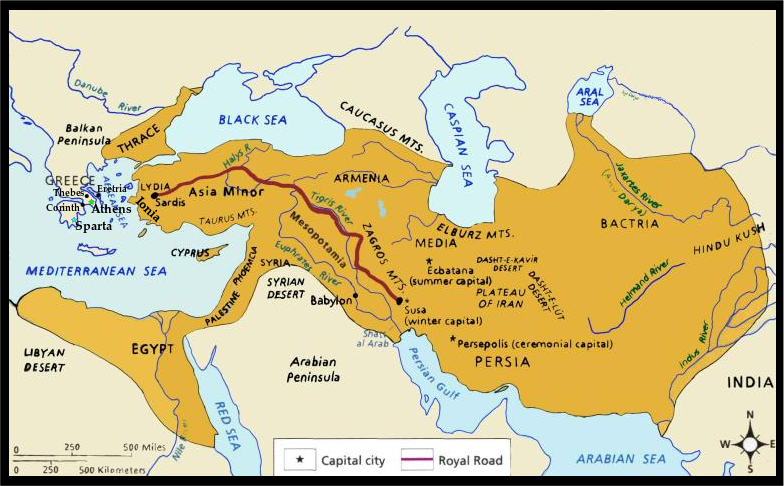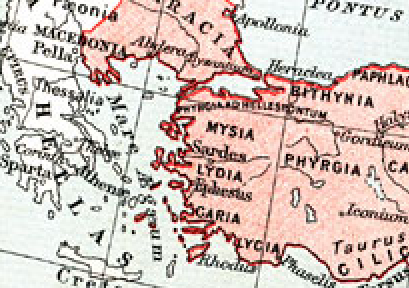Additional rules and notes
Player list
Story
A game for 23 players

Since I was a young child, I have been fascinated by antiquity. I might trace my interest back to the very first Age of Empires computer game or earlier. In the 6th grade I took a world history class, and most of my peers couldn't stand the teacher. They felt he was a mean old man, and they found the course boring. I was enthralled by it like nothing else, to the point that I considered pursuing this material academically for some time. I feel that in the modern era, even those among us with a fondness for history can often forget or ignore the foundations of our society as we know it. Everything which can be presently described as "western civilization" is largely rooted in ancient Grecian culture or otherwise owes its existence in some roundabout way to them.
The world would be a very different place today if the Greek city states had failed to rally against the Persian invaders who so vastly outnumbered them twice. Imagine the course of history had the emperor Xerxes completed his conquest of the Greek peninsula with the open opportunity to move further west into the fledgling Grecian and Etruscan societies which would become Rome centuries later. This was the last line of defense for the future of the European culture, and by most accounts -- it probably should have failed.
We will relive the conflict in the form of a Mafia game, and if the gods decree it, we will determine the future of the Greek people as well.
Characters:
Athens:
Win by eliminating the Persians. Gain total command of Greece by neutralizing the Spartans as well.
Themistocles
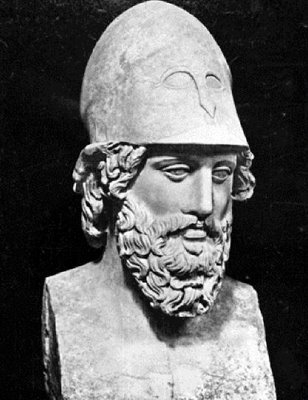
3-shot: Three times during the game during any separate night phases, Themistocles may target another player. A 4-sided dice will be rolled.
1 - The targeted player’s night action is redirected to a separate, randomly selected, non-Athenian player.
2 - The targeted player is roleblocked.
3 - The targeted player’s vote does not count during the following day phase and your vote is doubled.
4 - The targeted player’s alignment is revealed to Themistocles.
1-shot: Once per game during any night phase, Themistocles may prepare Athens for an invasion. This will cause all hostile, non-fatal night actions targeted upon Athenian players to automatically fail during that night phase.
Themistocles communicates with the Hellenic League anonymously through the host. If he is killed, Pericles will replace him (and this carries down the line in the order listed).
Pericles

1-shot: Once during the game during any night phase, Pericles may target a player. If that player is a Spartan, he or she will be roleblocked. If that player is a Persian, he or she will be jailed. If that player is any other alignment, nothing will happen.
1-shot: Once during the game during any night phase, Pericles may deliver a rousing funeral oration. This will be a written piece provided by the player to the host which memorializes all Athenian players killed to that point (minimum two for the action to be usable), and the host will present it to the game thread. Pericles will separately choose one among those memorialized and disperse any remaining night actions they did not utilize (if applicable) to living Athenians selected at random.
1-shot: Once during the game during any night phase, Pericles may invade Sparta. This will cause all night actions performed by any member(s) of the Spartan faction to fail automatically during that night phase. This action will resolve before any others during the night phase.
Miltiades
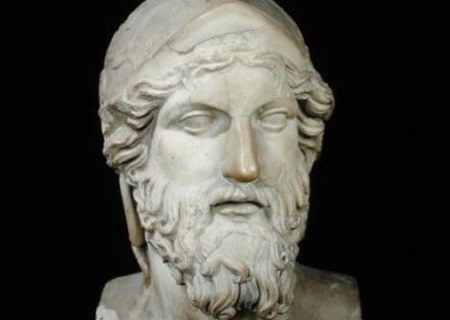
3-shot: Three times during the game during any separate night phases, Militiades may target another player. If that player is an Athenian, he or she will receive a 1-shot ability selected at random among the following: doctor, tracker, double vote, or misdirect. If that player is any other alignment, nothing will happen.
1-shot: Once during the game during any day phase, Militiades may lead his troops on a marathon to protect Athens. If either an Athenian or a Spartan is lynched that day phase, he or she will be permitted to continue posting in the game thread (without voting power) through the subsequent day phase before becoming deceased.
Cimon
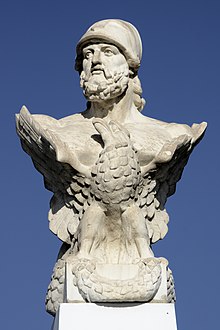
2-shot: Twice during the game during any separate night phases, Cimon may target another player. He or she will be told whether that player is Athenian or not Athenian.
1-shot: Once during the game during any night phase no earlier than Night 4, Cimon may rally the fleet. He or she will gain BTSC with one of the two Athenian commanders selected at random (unless one is deceased, in which case the selection will be defaulted to the living player). This will last the remainder of the game. Info-dumping will remain illegal in BTSC. If no Athenian commanders are alive, this action will not function.
Senator
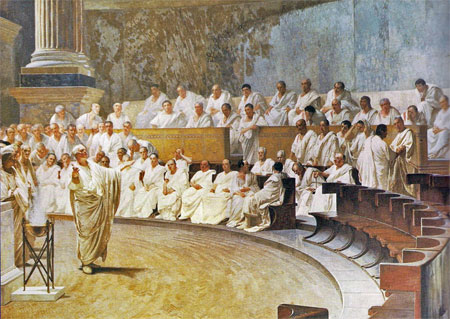
2-shot: Twice during the game during any separate day phases, the senator may select a player A and a player B. Player A will be permitted to send a single private message, through the host, to player B. This message may feature any content including role-sensitive information otherwise prohibited by the rules. Player A will not be permitted to reveal his or her identity.
1-shot: Once during the game during any day phase, the Senator may lock the tally. This means that all attempted vote manipulation that day will fail and the true tally will be exactly as it appears.
Trireme Commander
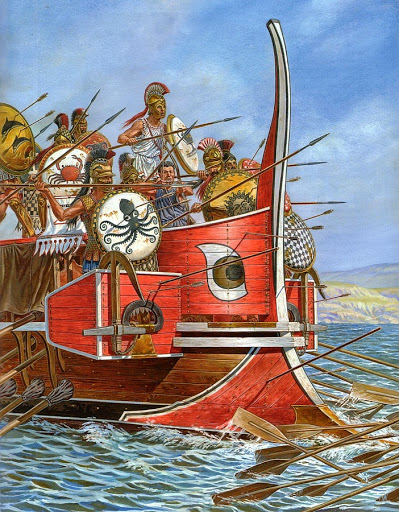
1-shot: Once during the game during any night phase, the Trireme Commander may target another player. The commander will be told who that player targeted if anyone during the previous night phase.
1-shot: Once during the game during any night phase, the commander may intercept another player. That player will be unable to target the intended player, and will be redirected to another player of a different faction from the initial target at random.
Ground Commander

2-shot: Twice during the game during any separate night phases, the Ground Commander may target another player. The commander will be told who targeted that player if anyone during the same night phase.
1-shot: Once during the game during any night phase, the commander may select a player. That player will be removed from the poll during the following day phase.
Pythia
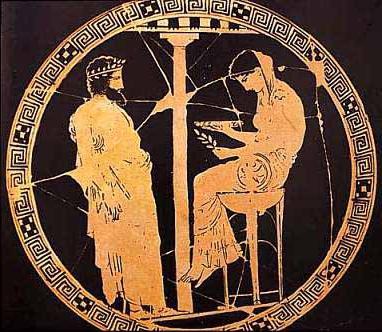
During each night phase of the game, the Pythia may utter a prophecy which will be posted publicly by the host after the following night phase. It takes time for messages to travel across the peninsula. You may also submit a prophecy on Day 0 to be posted at the start of Day 2. The prophecy must be written in dactylic | hexameter (or as close as you can reasonably get) to be posted publicly. The Pythia may not infodump or reveal his or her identity.
Sparta:
Win by eliminating the Persians. Gain total command of Greece by neutralizing the Athenians as well.
Leonidas
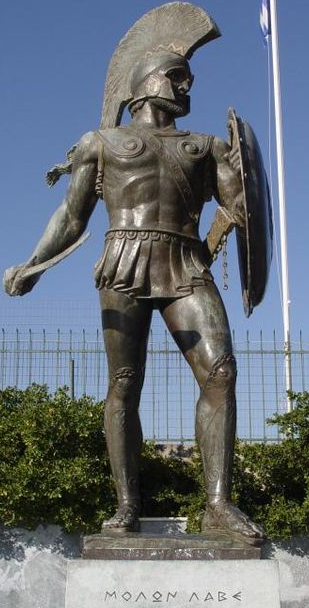
3-shot: Three times during the game during any separate night phases, Leonidas may target another player. A 4-sided dice will be rolled.
1 - The targeted player is killed (may only occur once, any second instance will result in no effect).
2 - The targeted player is roleblocked.
3 - The targeted player is quieted for the following day phase, unable to make more than five posts total (each no more than 20 words).
4 - The targeted player will be obligated to vote however Leonidas decides during the following day phase. This information will be known to both players by private message.
1-shot: Once during the game during any night phase, Leonidas may unite the Spartans. This will cause all hostile, non-fatal night actions targeted upon any member(s) of the Spartan faction to fail automatically during that night phase.
Leonidas communicates with the Hellenic League anonymously through the host. If he is killed, Pausanias will replace him (and this carries down the line in the order listed).
Pausanias

2-shot: Twice during the game during any separate night phases, Pausanias may target another player. He or she will be told whether that player is Spartan or not Spartan.
1-shot: Once during the game during any night phase later than the third, Pausanias may promote a Spartan officer. Upon activating this ability, one living Spartan of lower rank than Pausanias (featured lower in the character list) selected at random will have his or her votes permanently increased from 1 to 1.5 in tally value.
Brasidas
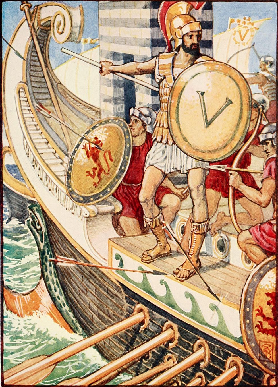
2-shot: Twice during the game during any separate night phases, Brasidas may select a player. Brasidas will be told who targeted that player during the same night phase if anyone.
If at the end of a day phase Brasidas leads the tally by two or fewer votes, there will be a 50% chance that he will survive and a player within two votes of his count will be lynched instead. This may only occur once.
Lysander

3-shot: Three times during the game during any separate night phases, Lysander may target another player. If that player is an Athenian, he or she will be jailed. If that player is a Persian, he or she will be roleblocked. If that player is any other alignment, nothing will happen.
1-shot: Once during the game during any night phase, Lysander may invade Athens. This will cause all night actions performed by any member(s) of the Athenian faction to fail automatically during that night phase. This action will resolve before any others during the night phase.
Hoplite Commander
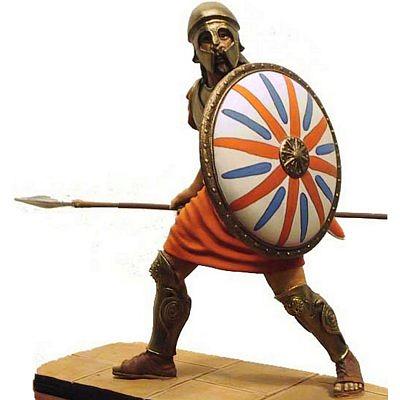
3-shot: Three times during the game during any separate night phases, this Hoplite Commander may target another player. He or she will be told who that player targeted during the same night phase if anyone.
2-shot: Twice during the game during any separate night phases, the Hoplite Commander may elect to sacrifice his or her life for the preservation of Sparta. If the night kill target is any other Spartan (and is not otherwise being prevented), the Hoplite Commander will die in his or her place. The killer’s vote will not function during the following day phase, and his or her first-listed non-killing role ability will be deducted one shot.
Aristocratic Councilman

1-shot: Once during the game during any night phase, this Aristocratic Councilman may target another player. He or she will be given any informational messages that player received during the same night phase if applicable.
1-shot: Once during the game during any day phase earlier than the fourth, the Aristocratic Councilman may elect to send a message to the present leader of the Spartan faction via the host. This message must feature advisement on Spartan dealings with the Hellenic League (such as potential bargaining options). No other dialogue may be included, not even that which is off-topic.
Ephor
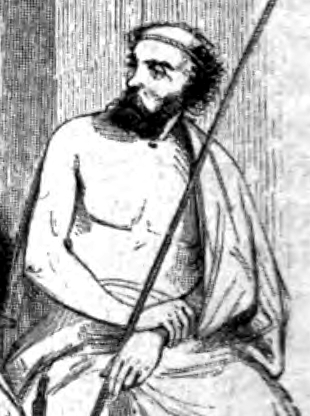
2-shot: Twice during the game during any separate day phases, the Ephor may target a player. That player’s vote will not count during that day phase. This is not applicable to votes placed upon this Ephor.
1-shot: Once during the game during day phase, the Ephor may grant another player the opportunity to fight execution. All players placing a vote on that player will themselves have one extra vote placed upon them.
Helot

Any vote the Helot places for a member of the Spartan faction will not count. This will not apply in any scenario wherein the lynch can decide the winner of the war.
Once during the game during any day phase later than the third, the Helot may elect to permanently sacrifice his or her voting rights to become immune to all lynches and night kills (and publicly revealed as such).
Persians:
Gain total command of Greece to win by defeating the Athenians and Spartans. The Persians kill as a faction every night phase.
Darius the Great
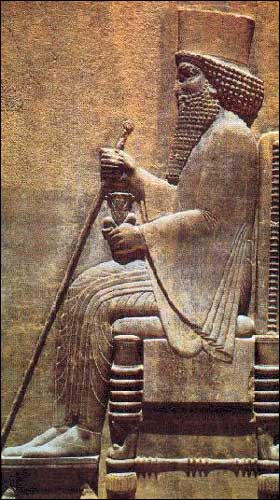
3-shot: Three times during the game during any separate night phases, Darius the Great may target two other players (Player A and Player B). Actions performed by Player A will be targeted upon Player B instead of the intended target.
If Darius the Great is lynched, all voting on the following day phase will be conducted entirely in private (in a message to the host). There will be no poll, and it will be illegal for all players to reveal or strongly hint at their intended votes publicly. Vote changes will also be illegal. This effect will last only the day phase following the lynch of Darius the Great.
Darius the Great communicates with the Hellenic League anonymously through the host. If he is killed, Xerxes will replace him (and this carries down the line in the order listed).
Xerxes
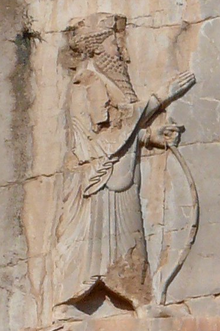
3-shot: Three times during the game during any separate night phases, Xerxes may target another player. That player will be roleblocked.
1-shot: Once during the game during any night phase, Xerxes may select a player. There will be a 50% probability that that player will be killed. There will be a 25% probability that the attempt will fail and instead inspire the target with a new fury, doubling his or her vote during the next day phase. There is a 25% chance that the player will be so sorely wounded that he or she will be unable to communicate cogently until the following night phase. This ability is separate from the factional night kill.
1-shot: Once during the game during any night phase, Xerxes may enact the power of a demigod emperor. Any hostile, non-fatal actions targeted upon Persian players will automatically fail during that night phase.
Artaphernes

2-shot: Twice during the game during any separate day phases, Artaphernes may add one extra vote to any selected player.
2-shot: Artaphernes can perform night actions, including the faction kill, with total immunity to protective or disruptive roles which might prevent the acts from functioning (doctors, jailers, misdirectors, and roleblockers for example). This may not be done on consecutive night phases.
Mardonius

3-shot: Three times during the game during any separate night phases, Mardonius may target another player. He or she will be told that player’s role.
2-shot: Twice during the game, Mardonius can perform night actions, including the faction kill, with total immunity to investigative roles who might witness the acts (trackers and watchers, for example). This may not be done on consecutive night phases.
Hellenic League:

The three members of the Hellenic League are completely neutral when the game begins. Their task is to communicate with leaders of all three major factions (the Athenians, Spartans, and Persians) to determine where they feel their allegiances would best lie, individually. Each of the three comes from a different province of Greek influence where they have access to unique goods and services (we’ll call them “items”). They have the ability to use these items as negotiating pieces.
*SECRETS*
Diplomatic Representative of Corinth
This Diplomatic Representative has BTSC with the other two. He or she carries three items from Corinth:
1 - Oracle of Apollo stone (1-shot alignment check)
2 - Healing salve (1-shot night protection)
3 - Greek fire (1-shot double vote)
Diplomatic Representative of Eretria
This Diplomatic Representative has BTSC with the other two. He or she carries three items from Eretria:
1 - Poisoned rations (1-shot non-fatal poison)
2 - Elite-skilled scout (1-shot watch)
3 - Taxation surplus (1-shot selected at random from those included elsewhere in this game)
Diplomatic Representative of Thebes
This Diplomatic Representative has BTSC with the other two. He or she carries three items from Thebes:
1 - Persian broadsword (1-shot kill)
2 - Strategic documents (1-shot role check)
3 - Updated cartography (1-shot track)
The three members of the league will have BTSC to start the game. Their identities will not be revealed beyond their province of origin. During each phase of the game, day and night, the members of the Hellenic League will be able to negotiate with the other three factions. They will be permitted to send the host ONE personal message each per phase within which they detail which factions they want to speak to and what they want to offer. Negotiation will feature members of the Hellenic League offering their items to each faction leader in exchange for a good or service held by that faction (defined as any single shot of any ability that faction possesses). Only one offer may be made per phase.
For example:
The Diplomatic Representative of Corinth may offer to Themistocles the Oracle of Apollo stone (1-shot alignment check) in exchange for one of the Athenian tracker shots owned by Ground Commander. This offer will be entirely anonymous; neither player will know the identity of the other. If Themistocles accepts this offer, then the exchange will be finalized during the phase following that agreement. Themistocles will then give the item to an Athenian role of his choice, not including himself, and not knowing which player occupies that role. Likewise, leaders of the three factions are permitted to make offers to representatives of the Hellenic League which can be accepted or rejected as those representatives desire. Faction leaders may only send one response per phase. It may feature an acceptance, rejection, or counter-offer. If an offer is made for an ability which has already been expended, only the faction leader will be informed of this so that a counter-offer may be possible.
Members of the Hellenic League are not permitted to use their own items, but they may use abilities they have gained through negotiation. They may also use abilities they have gained through negotiation for further negotiation. Each member of the Hellenic League is only permitted to give one of their original item to any single faction. This means that, for example, the Diplomatic Representative of Corinth may not give all three of his or her original items to the Persian faction through negotiation. They must be spread among the three factions.
Once a member of the Hellenic League has traded away all of their original items, they will be required to declare an allegiance to one of the three factions privately to the host. After doing so, his or her win condition will align directly with that faction’s. Any member aligning with the Persians will not be told their identities or added to their BTSC, but they will win or lose alongside them. Upon choosing a side, the Hellenic League member will be removed from the Hellenic League BTSC. Their choice will not be revealed to those still active in it.
*SECRETS*
~~~~~~~~
The win conditions for the Athenians, Spartans, and Persians may be confusing. The two civilian factions only need to defeat the Persians to be declared winners and earn a banner. However, they can improve the glory of their victory after that by also neutralizing the opposing civilian faction. Either way they win the game, but it's a better win to command all of Greece (I'll make a different banner to commemorate those winners). The Persians need only defeat the civilian factions to command Greece -- they have just one objective and one category of victory.





































































 [-Mass Effect Mafia banner-]
[-Mass Effect Mafia banner-]



